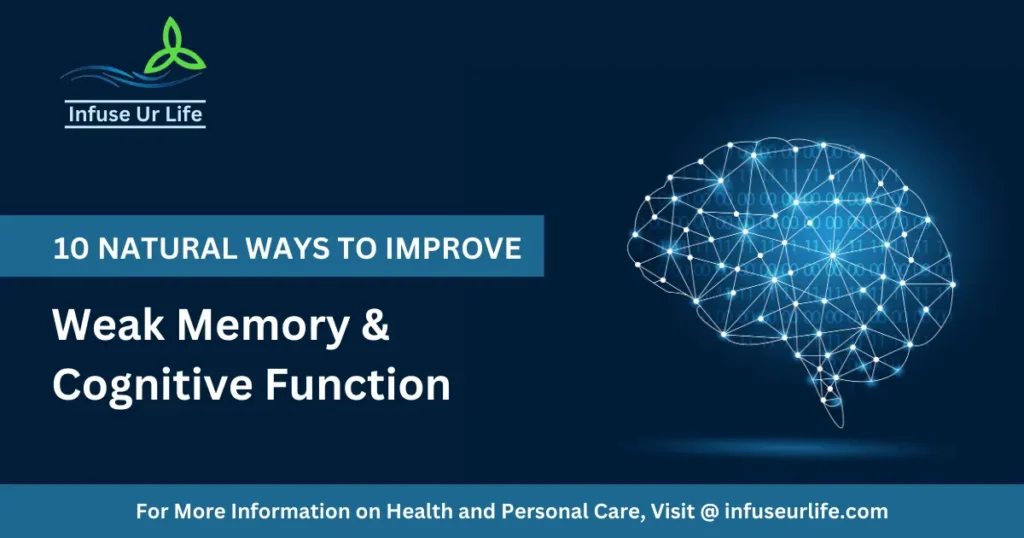10 Natural Ways to Improve Weak Memory

Quick Links
ToggleIntroduction
Do you ever find yourself forgetting where you placed your keys, struggling to recall a name, or remembering your past precious moments? You’re not alone. In today’s fast-paced world, our minds are constantly bombarded with information, making it challenging to retain and recall important details.
Memory is like your brain’s storage system. It’s the ability to store and recall information that you’ve learned or experienced. Just like you might save important documents in a filing cabinet for future reference, your brain stores memories for you to access when you need them. These memories can be about anything, from what you had for breakfast today to your favourite childhood vacation.
When you remember something, it’s like pulling out a file from your brain’s storage system and referring to it again. In short, we can say that memory is an incredibly essential part of your body and helps you remember things from the past and learn new things for the future.
What is the Human Brain?
Do you know that the human brain is an integrated organ that controls memory, emotion, touch, your thoughts, breathing, vision, and every sensory stimulus that controls the human body? As everything ages and weakens with time, the same applies to our brain.
With time, the strength of our brain wears out, and hence memory fades away after the body reaches the age of 65 and beyond. This is a regular process in the human body, but when you start losing memory and find it difficult to recall it at an early age, it becomes a problem.
This problem is generally known as cognitive impairment or cognitive disorder. In such a situation, a person’s ability to think, memorise, or retain old memories gets off-track.
Do you have the same problem? Do you also find it difficult to recall old memories? If this is so, then fear not, as the power to boost memory naturally lies within your control. In this article, I am going to provide you with effective natural ways through which you can boost your brain power and strengthen its capacity to hold memories for a long period of time.
Here, we will explore ten proven natural methods to unleash the full potential of your memory.
Are you ready to sharpen your mind? Let’s dive into the world of memory enhancement and discover how you can improve your brain health easily.
10 Natural Ways to Sharpen Your Brain and Boost Its Power to Retain Memory
Almond Milk
Taking almond milk daily is considered the most effective treatment and helps you significantly improve your brain power.
Everyday, you need to soak seven (7) almond pieces in a glass containing water in the evening.
The next day in the morning, just take the almonds out of the water, peel off their outer layer, and crush them into small pieces.
Now take hot milk in a glass and mix almonds into it. Again, take it to boiling.
When it’s done, take off the milk vessel from the stove and then mix 1 spoonful of desi ghee and 2 teaspoons of Bura sugar into it. Now let the milk cool down to get lukewarm.
This almond-rich milk you have to take for 15 to 40 days without any break. With this, you don’t only boost your mind and memory power but also strengthen the semen in your body.
This almond milk is more effective in the winter, though you can also take it in the summer. For people who do mental work, this almond milk is an inevitable source of mind power and works as a booster dose.
It is recommended to take this almond milk early in the morning on an empty stomach. For the next two hours after taking the almond milk, you are not supposed to eat or drink anything. However, if required, you can drink water, but make sure to drink it after half an hour at least.
Benefits of Taking Almond Milk
- Boost brain power
- Reduce the probability of a headache
- Sharpen your memory
- Improved eyesight if crushed black pepper is mixed with almond milk
Shankhpushpi
If drinking almond milk is not possible, Shankhpushpi is a great and effective alternative remedy that helps you keep your brain healthy and boosts mind power.
What is Shankhpushpi?
Shankhpushpi (Convolvulus pluricaulis) is a perennial herb found primarily in India. The plant typically grows in moist areas and is known for its traditional use in Ayurvedic medicine.
In Ayurveda, Shankhpushpi has been used for centuries for its potential medicinal properties, particularly for enhancing brain function and promoting mental health. It is believed to have memory-enhancing, neuroprotective, and anxiolytic (anxiety-reducing) effects.
Process to Take
In this case, you need to take 3 grams (1 teaspoon) of Shankhpushpi powder and take it daily with either 1 glass of milk or sugar syrup for 3–4 weeks (especially in summer) regularly. This not only boosts memory but also improves brain strength.
Benefits of Taking Shankhpushpi
- Enhance memory
- Improve focus and concentration
- Reduce stress and anxiety levels
- Boost brain health
Physical Exercises
Exercises play a crucial role in enhancing brain power and cognitive function. Incorporating regular physical exercises into your routine can significantly improve your brain power, as it promotes neuroplasticity, reduces stress, improves mood, enhances executive function, preserves brain volume, and promotes better sleep.
Types of Exercises to Perform for Better Memory Power
- Yog
- Strength Training
- Aerobic Exercise
- Balance and Coordination Exercises
- High-intensity interval training (HIIT)
- Sports and Recreational Activities
- Mental exercises such as Crossword Puzzles and Brain Games
- Social Engagement
The Best Time to Perform Exercises
The timing of exercise is very crucial as it highly influences the impact of exercise on memory power. Whether you prefer morning, afternoon, or evening workouts, aim to add exercise to your daily or weekly schedule to gain cognitive benefits over the long term. Listen to your body and adjust your exercise timing based on how it affects your energy levels, mood, and sleep patterns.
General Guidelines for Performing Exercises
You can workout at any time of the day, but performing exercises early in the morning or evening is highly beneficial for the body and brain.
Morning Workout: Performing exercises in the morning is highly beneficial for memory power as it jumpstarts the metabolism, improves sleep quality, and overall boosts memory power in the human body.
Evening Workout: Exercising in the evening is equally beneficial, particularly for stress relief and relaxation. It potentially influences sleep and indirectly boosts brain power and cognitive functionality.
Proper Hydration
In the human body, the brain consists of about 75% water and needs adequate hydration for proper functioning and maintaining its structure and function.
Proper hydration helps maintain the balance of electrolytes, such as sodium and potassium, in the body. Electrolytes are essential for efficient brain communication and cognitive processing.
Moreover, it helps maintain adequate cerebral blood flow, which is responsible for providing oxygen and nutrients to the brain. Hence, it is clear that proper hydration is another crucial element to maintain cognitive balance and boost memory power.
In contrast, dehydration negatively impacts cognitive function, including memory. Therefore, it is suggested to drink plenty of water throughout the day to stay hydrated and keep the brain running properly.
Different Ways to Stay Hydrated
Staying hydrated is another factor for a healthy mind, and there are several ways to ensure adequate hydration throughout the day. Here are different ways to stay hydrated:
Drink Water: The simplest and most effective way to stay hydrated is to drink water regularly throughout the day. Aim to drink at least 8 glasses (about 2 litres) per day, or more if you’re physically active or in a hot climate.
Eat Hydrating Foods: Include water-rich fruits and vegetables such as watermelon, cucumber, oranges, strawberries, celery, and lettuce in your diet to stay hydrated.
Drink Herbal Teas: Avoid caffeinated beverages such as tea and include herbal teas, such as peppermint, chamomile, or ginger tea, for body hydration.
Consume Hydrating Beverages: Beverages like coconut water, sports drinks (without added sugars), and electrolyte-enhanced waters help replenish fluids and electrolytes lost and are therefore recommended for adequate hydration.
Infuse Water with Flavour: Infuse normal water with natural flavours such as lemon, lime, cucumber, mint, or berries to make it tasteful or better in taste.
Enough Sleeping
Proper sleeping is another crucial factor that helps maintain high memory power and overall cognitive functioning.
When you get enough sleep, your mind forms new connections between the neurons that are responsible for learning, memory, and cognitive function. Also, your ability to manage stress and emotional challenges improves.
Health benefits that you gain after taking adequate sleep and proper rest.
Memory Consolidation: During sleep, the brain consolidates memories, transferring information from short-term to long-term memory storage. This process is essential for processing and retaining new information, skills, and experiences.
Memory Retrieval: Quality sleep improves memory retrieval, allowing you to recall information more accurately and efficiently. Sleep deprivation can impair memory recall and cognitive performance, making it harder to concentrate and remember details.
Emotional Regulation: Sleep helps regulate emotions and mood, which can affect memory function. Adequate sleep enhances emotional stability and resilience, allowing you to better manage stress and emotional challenges that can interfere with memory consolidation and retrieval.
Attention and Concentration: Restorative sleep improves attention, focus, and concentration, which are essential for encoding and storing memories effectively. Sleep deprivation can impair cognitive function, attention, and decision-making, making it harder to process and retain information.
Tips to Optimise Sleep for Better Memory Power
- Maintain a Consistent Sleep Schedule
- Create a Relaxing Sleep Environment
- Limit Screen Time Before Bed
- Establish a Bedtime Routine
- Limit Caffeine and Stimulants
- Manage Stress
- Regular Exercise
Stress Management
When you are stressed, your brain releases hormones like cortisol and adrenaline, which disrupt the neural networks involved in memory formation. Consequently, memories are encoded or consolidated less effectively, leading to gaps or inaccuracies in memory recall.
Moreover, high stress may disrupt working memory function, making it harder to maintain focus, follow instructions, or solve problems effectively. Sometimes, acute stress may improve memory by increasing arousal and attention, but this happens once in a while.
In most cases, prolonged stress always deteriorates brain power and causes weak memory power. Therefore, to stay out of stress and improve your cognitive function, you need to follow some steps.
Steps for effectively managing stress and boosting overall mental power
Practice Relaxation Techniques such as deep breathing exercises, progressive muscle relaxation, guided imagery, or mindfulness meditation can help alleviate stress and improve cognitive function, including memory.
Exercise Regularly: Perform physical activities of moderate-intensity for at least 30 minutes in a day regularly.
Prioritise Sleep: Take adequate sleep for 7-9 hours each night to allow your brain to consolidate memories effectively and recharge for the day ahead.
Maintain a Healthy Lifestyle: Eat a balanced diet, stay hydrated, and avoid excessive alcohol, caffeine, and nicotine.
Set Realistic Goals and Prioritise Tasks: Break tasks down into manageable steps and say no to tasks or commitments that add unnecessary stress to your life.
Establish Boundaries: Practise assertiveness and communicate your needs effectively to reduce unnecessary stress.
Cultivate Supportive Relationships: Surround yourself with supportive friends, family members, or mentors and share your feelings and experiences with them for emotional support and encouragement.
Limit Sugar Intake
Excessive sugar consumption can impair brain power and cognitive function by disrupting blood sugar levels. It may cause inflammation and oxidative stress, insulin resistance and metabolic dysfunction, mental health disorders, and disrupt neurotransmitter function.
We all know every organ of our body is interconnected, and no organ works in isolation. Whatever you take in your food, directly or indirectly, adds positive or negative value to your neural network. Hence, we need to be very careful while selecting food items that have less or no sugar in their ingredients.
Making gradual changes to your diet can significantly help you improve your brain power and store memory in your mind for a long time. Always focus on making sustainable lifestyle modifications that work for you.
Steps to Limit Sugar Intake in Body
Here are some steps that can help you reduce your sugar intake and boost your memory power and overall brain health:
- Read Food Labels: Pay attention to food labels and ingredient lists and choose products with little to no added sugars.
2. Choose Whole Foods: Prepare your diet around whole, nutrient-dense foods, as they are naturally lower in added sugars and provide essential nutrients to support brain health and cognitive function.
3. Limit Sugary Beverages: Cut back on sugary beverages such as soda, fruit juices, sweetened teas, and energy drinks. Instead, opt for water, sparkling water, herbal tea, or unsweetened beverages.
4. Reduce Processed Foods: Minimise consumption of processed and packaged foods and choose whole, minimally processed alternatives whenever possible.
5. Cook Meals at Home: Prepare meals and snacks at home using fresh, whole ingredients. Try to use flavorful herbs, spices, and natural sweeteners to enhance the taste of your dishes.
6. Be Mindful of Portion Sizes: Pay attention to portion sizes when consuming foods. Stick to the recommended serving sizes to help manage your overall sugar consumption.
7. Plan Ahead and Snack Wisely: Plan your meals and snacks ahead of time and keep healthy, low-sugar snacks on hand, such as fresh fruit, vegetables, nuts, seeds, etc.
8. Limit Desserts and Sweets: Prepare desserts and sweets with fewer added sugars or make homemade versions using natural sweeteners.
Mindful Alcohol, and Caffeine Consumption
Excessive consumption of alcohol, caffeine, and tobacco can have acute effects on memory and cognitive function, as they may increase the risk of cognitive dysfunction and dementia.
Uncontrolled alcohol intake impairs memory formation and leads to blackouts or gaps in memory. Alcohol-related memory impairments can range from mild forgetfulness to severe memory loss, depending on factors such as the amount consumed, individual tolerance, and frequency of alcohol use.
Similarly, imprudent caffeine consumption contributes to high levels of anxiety and impairs cognitive performance in the long run. However, if caffeine is taken wisely, it may improve memory consolidation and retrieval, particularly for tasks requiring sustained attention and vigilance.
Social Engagement
The social circle plays a vital role in our memory function. If you are the kind of person who stays active socially and always remains connected with your near and dear ones, then your chances of developing stress and anxiety get reduced.
By participating in social activities, maintaining strong social connections, and fostering meaningful relationships, individuals can support their brain health and potentially reduce the risk of age-related cognitive decline and memory impairment.
Benefits Associated with Social Engagement
- Cognitive Stimulation: Interacting with others, engaging in conversation, and participating in social activities helps keep the brain active and contributes to enhancing memory retention and cognitive function.
- Emotional Support: Social connections provide emotional support, which can reduce stress levels and promote mental well-being.
- Mental Health Benefits: Social engagement is highly effective in reducing the risk of depression, anxiety, and loneliness. Indirectly, social connections support memory power by promoting overall emotional well-being.
- Intellectual Stimulation: Social interactions often involve discussions, debates, and the sharing of ideas, providing intellectual stimulation. Exchanging knowledge, learning from others, and engaging in intellectual pursuits keep the mind sharp and enhance memory power.
Less Tobacco Intake
Tobacco use, particularly smoking, negatively impacts mental power and cognitive function in various forms, including impaired memory, decreased attention and concentration, structural and functional changes in the brain, an increased risk of mental health disorders, and vascular effects.
Negative Impacts of Tobacco on Brain
- Reduced Cognitive Function: Chronic tobacco use, particularly smoking, often leads to cognitive impairment and deficits in various cognitive domains, including memory, attention, processing speed, and executive function. Nicotine, the primary psychoactive component in tobacco, affects neurotransmitter systems in the brain, which in turn leads to cognitive malfunction.
2. Impaired Memory: Smoking has been linked to impairments in memory function, including both short-term and long-term memory. Prolonged exposure to nicotine and other harmful chemicals in tobacco smoke interferes with synaptic plasticity, the process by which neurons form new connections, and deteriorates memory power.
3. Decreased Attention and Concentration: Nicotine acts as a stimulant, and its excessive use usually leads to tolerance and dependence, which in turn cause withdrawal symptoms at low levels of nicotine in the body. Withdrawal symptoms, such as irritability, anxiety, and difficulty concentrating, impair mental power and cognitive function.
4. Impact on Brain Structure and Function: Long-term smoking is connected with structural and functional changes in the brain, including changes in gray matter volume, reduced blood flow, and increased oxidative stress and inflammation. These changes contribute to cognitive degradation and high risk of neurodegenerative diseases such as Alzheimer and vascular dementia.
5. Risk of Mental Health Disorders: Smoking is associated with an increased risk of mental health disorders such as depression, anxiety, and schizophrenia. These mental health conditions can further aggravate cognitive impairment and mental power.
6. Vascular Effects: Long-term tobacco use is known to damage blood vessels and impair blood circulation to the brain. This can compromise oxygen and nutrient delivery and further cause cognitive dysfunction, an increased probability of stroke, and other vascular-related cognitive impairments.
Steps to Limit Intake of Tobacco Products
Set a Quit Date: Choose a specific date to quit smoking or reduce tobacco intake, and commit to it.
Seek Support: Don’t hesitate to seek support from your friends, family, and healthcare providers to help you stay motivated and quit smoking at the earliest.
Understand Your Triggers: Identify the situations, emotions, or activities that trigger the urge to smoke or use tobacco. Once you understand your triggers, develop strategies to cope with them effectively.
Prefer Nicotine Replacement Therapy (NRT): Consider using nicotine replacement therapy, such as nicotine patches, gum, lozenges, or inhalers, to help manage withdrawal symptoms and cravings. NRT provides a controlled dose of nicotine to gradually wean you off tobacco while reducing the severity of withdrawal symptoms.
Conclusion
In a fast-moving lifestyle, weak memory power may hamper your personal and career growth and cause a significant setback in your life. If you feel that you are also facing this problem, then immediately get into action and seek urgent medical advice for strong cognitive function.
Incorporating the above mentioned 10 natural methods into your daily routine can significantly enhance memory power and cognitive function.
By prioritising activities such as regular exercise, healthy eating, adequate sleep, stress management, and social engagement, you can optimise your brain health and support long-term memory retention. Remember that small changes can make a big difference in life, so start implementing these strategies today to unlock the full potential of your brain and enjoy a sharper memory for years to come.


